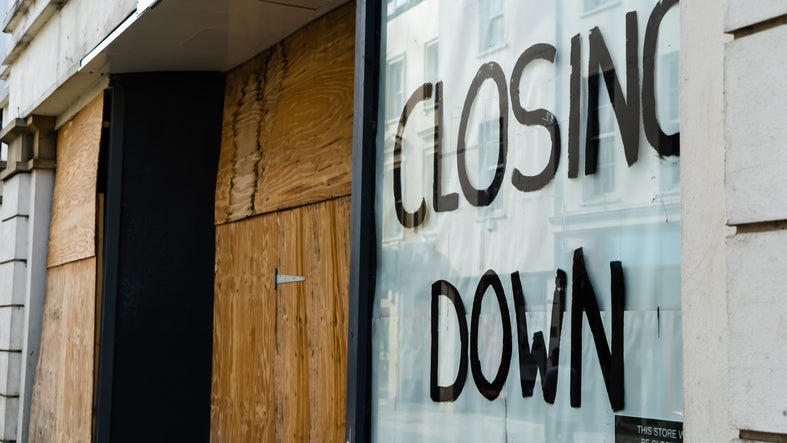How to successfully close down your business
No matter whether you’ve built the company from the ground up or you joined to take on a new challenge, opting to close your company can be one of the hardest business decisions you’ll have to make.
And, with so many steps to closing your business, it’s crucial that you make sure that it’s shut down properly and in accordance with any legal guidelines. But, how exactly do you do that?
To help you streamline the process — and tie up any loose ends — our handy guide is here to walk you through the steps you need to implement and the procedures you need to take when closing down your business.

What does it mean to close down your business?
Regardless of the circumstances surrounding the closure of the business, sometimes things simply just don’t go according to plan.
Once you’ve made the difficult decision to close the company, this means that you have to cease operations and stop trading immediately. You’ll then have to register the business as a solvent or insolvent company, depending on the circumstances.
What is the difference between a solvent vs insolvent company?
Although there are many reasons why a company may enter liquidation — whether this is voluntary or not — they’ll have to be registered as solvent or insolvent.
Solvent company
If a company serves no useful purpose as a business but is still able to meet any long-term financial obligations, then it can be classed as solvent.
A solvent business will be free from legal action or any threats from creditors — essentially meaning that it’ll be easier to shut down your business.
Insolvent company
When a company can’t pay its debt to creditors, or when it has more liabilities than assets on the balance sheet, this means the company is insolvent.
Companies can become insolvent for a number of reasons — with or without fault being placed on the company directors. This includes:
- Late payments from customers
- A large or significant dip in the market
- An increase in competition
- A major supplier or customer enters liquidation
How do I know what my business should be classed as?
If you’re unsure whether your business should be classed as solvent or insolvent, there are several ways to determine which one your business falls into.
- The Cash Flow Test — Under the Insolvency Act 1986, a business is rendered insolvent if it’s ‘unable to pay its debts as they fall due’. The Cash Flow Test will highlight if your company is able to meet the PAYE and VAT requirements. If not, it’s quite likely that the business will be insolvent.
- The Legal Action Test — If a creditor is owed over £750, they will be entitled to put forward a formal demand for the sum. This then has to be paid within three weeks. If it isn’t paid within the timeframe, the law will deem the company insolvent.
- The Balance Sheet Test — If the outstanding debts of the company outweigh the assets — which can be anything from stocks, equipment and technology to cash and properties — the company will be considered insolvent. Essentially, this will prove problematic when the company assets are liquidised as it will make it near impossible to repay creditors.
What are the different ways of closing a business?
No matter whether there may have been good intentions when the company was first set up, there can be many reasons why you want to close down your business.
First, however, you’ll have to get to grips with the different ways that you can close a business and the potential risks of becoming personally liable for the company's debts.
Company dissolution
The most straightforward and cost-effective method of closing down a business, company dissolution works in favour of companies that are solvent. As the director of the business, you’ll have to make sure that you follow strict procedures and guidelines prior to the closure. This includes:
- Submitting final accounts
- Closing any business bank accounts that are in operation
- Notifying HMRC of the closure
- Paying all creditors in full
Prior to the closure, the company must cease trading three months before and not change its name during this time. Once all the requirements have been met, the company will be struck off the Companies House register and will cease to exist.
Compulsory liquidation
When a creditor takes legal action against the company, you’ll receive what’s known as a ‘winding up petition’. Essentially, this is a creditor’s last resort at trying to get paid what they’re owed after unsuccessful attempts to recoup the money. After these attempts, compulsory liquidation will follow, with the end result being the company closes down and is taken off the register.
Any assets that are left from the business will be acquired by the creditors in an attempt to pay off debts. Any directors in the business will be investigated for any instances of wrongdoings or fraudulent activity and, if proven, could result in disqualification.
Members Voluntary Liquidation (MVL)
Sometimes known as solvent liquidation, Members Voluntary Liquidation (MVL) is appropriate for your business if it’s able to pay its debts and any financial obligations.
The most tax-efficient method for directors, MVL means that shareholders can obtain the value of the company instead of being charged capital gains tax and income tax.
If you apply for MVL, you’ll need to complete the following:
- At least 75% of the directors must sign a declaration of solvency.
- Any shareholders must pass a resolution for the voluntary winding-up procedure.
- The resolution must be published in The Gazette Official Public Record within 14 days of the decision.
- An authorised insolvency practitioner must be appointed as a liquidator. Then they must take charge of winding up the company.
- Whatever the resolution may be, you must inform Companies House of the decision within 15 days of the passing.
Creditors Voluntary Liquidation (CVL)
A Creditors Voluntary Liquidation (CVL) can be instigated by the directors of a failing company who choose to bring their business to an end.
Although this process is entered into on a voluntary basis, it typically follows a spate of financial distress where the chance of a successful turnaround is slim. Although the liquidator will investigate the actions of the director(s) leading up to the insolvency, you’re less likely to face accusations because you’ve proactively opted to put the company into liquidation.
Dormancy
A company is classed as dormant when it carries out no business activities or hasn’t received any income for a set period of time.
Making your company dormant can be an ideal option if you intend to step away from the company for a short period of time, or if you’re unsure whether the business might be best used again in the future.
Your company will remain registered on Companies House, however, you’ll have to submit ‘dormant accounts’ each year and file a company tax return with HMRC.
What are the requirements to close my company on Companies House?
If you choose to close your company, then you’ll have to make sure that it’s struck off Companies House. To do this, you’ll need to make sure that your company:
- Hasn’t traded or sold any stock within the last three months
- Hasn’t changed names in the last three months
- Has no existing debts
- Has no agreements with any creditors
- Isn’t threatened with liquidation
Before closing down your company, you must make sure that you’re closing it down legally. This means you’ll also have to:
- Announce the plans to HMRC — It’s also worth notifying any other interested parties.
- Fill in a strike off application — Once this is filled out, you have to send a copy within 7 days to anyone who could be affected. This includes:
- Employees
- Managers or trustees of any employee pension fund
- Shareholders
- Creditors
- Directors who didn’t sign the application form
- Make staff redundant — Pay employees their final wage or salary and follow the rules of making them redundant.
- Share business assets — Make sure that all business assets are shared among shareholders before the company is struck off. Anything that’s left will go to the Crown.
- Get financial accounts in order — Send final statutory accounts and a Company Tax Return to HMRC.
How long does it take to close a company?
Generally, it should take a minimum of three months to close your company, but the length of time can vary depending on whether the company is solvent or insolvent when closing.
You’ll also need to factor in the initial three-month period leading up to the application for dissolution, during which you’ll begin to wind down the company affairs.
If your company cannot pay its debts and goes into liquidation, it can take anywhere from six months to two years to fully close down.
How much does it cost to close a company?
The costs involved in closing your company will vary depending on the way in which it is closed. The fee for a company dissolution is £10 for a paper DS01 form application which can only be paid via cheque or postal order. Or, £8 when applied online and paid for using a debit or credit card.
You’ll also still have to pay off any outstanding debts and make sure that all employees are paid their salary or wage.
Can I close a company and start a new one?
Providing you’ve taken all the steps to ensure that your previous company is completely shut down and complying with the Companies House procedures, there’s nothing to stop you from starting a new business venture.
HMRC will, however, prohibit you from using the same company name or similar.
Preparing to close your company
While the process of closing your company can seem like a daunting and overwhelming task, being prepared is key. From understanding whether your business is solvent or insolvent to knowing how much it costs to sell, these steps are essential to making this a fairly straightforward process.
If you do close your business down, you'll also need to consider what happens with any service and utility contracts you still have running. The team at Bionic can help with contracts related to business gas, business electricity, business insurance, phone and broadband.







